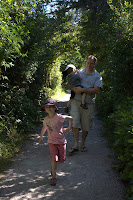We would also have one day devoted to Music (including study of one composer), one day for art (when kids would get a chance to meet a famous artist and his works), and one science day which would include nature walk and nature journal keeping. Although this looks like too much work, Charlotte Mason encouraged all lessons to be short as not to bore children. Here is a weekly plan I made: My weekly planner (you are welcome to use it but if you share it please link it to my page).
 I start by planing what our school year is going to look like. I found that having 5 semesters of 6 weeks each works best. What that means is that for the duration of the semester we keep the same history time period, same composer, and same artist. For example, in one semester we would learn music and life of Bach, 6 works of Leonardo DaVinci (one work per week), and we would study Ancient Greece. Next semester we would switch to a different composer, different artist and continue chronologically with next time period. Note, I always try to match the composer and artist from the same era, that way the kids can get a better picture of their lives. More on that in other posts.
I start by planing what our school year is going to look like. I found that having 5 semesters of 6 weeks each works best. What that means is that for the duration of the semester we keep the same history time period, same composer, and same artist. For example, in one semester we would learn music and life of Bach, 6 works of Leonardo DaVinci (one work per week), and we would study Ancient Greece. Next semester we would switch to a different composer, different artist and continue chronologically with next time period. Note, I always try to match the composer and artist from the same era, that way the kids can get a better picture of their lives. More on that in other posts.At the beginning of the year I print a list of all the countries of the world, cut them all up, put them in a hat and let the kids pick out 30 of them. They will be the 30 countries we study that year. Next year I do the same, except I take out the ones we already have done, just so we don't have doubles. I then print map of the country and look for a recipe to each country we will get to know. It really makes it more fun to learn geography this way.
 For History, we usually read one living book everyday until it's done, and then we have more detailed look at that history period on our History Day. We also plot important dates we come across in the living books in Book of Centuries. I made one before, but this year I found one in One Stop Bookstore called Book of Centuries, A recreation of the 1923 original by Janis Scott. It starts at 4200BC, so it's a bit limited in prehistory, but for most elementary and even middle schools it will do just fine.
For History, we usually read one living book everyday until it's done, and then we have more detailed look at that history period on our History Day. We also plot important dates we come across in the living books in Book of Centuries. I made one before, but this year I found one in One Stop Bookstore called Book of Centuries, A recreation of the 1923 original by Janis Scott. It starts at 4200BC, so it's a bit limited in prehistory, but for most elementary and even middle schools it will do just fine. Science day is very fun too. We usually read living books on science, experiment (store bought kits or kitchen experiments), go for Nature walk and draw in Nature journals, detailing all the day's observations. For science we go to library and pick few books on any topics and study them. It really doesn't have to be very structures as long as the topics are varied and numerous.
Science day is very fun too. We usually read living books on science, experiment (store bought kits or kitchen experiments), go for Nature walk and draw in Nature journals, detailing all the day's observations. For science we go to library and pick few books on any topics and study them. It really doesn't have to be very structures as long as the topics are varied and numerous.So this is a short overview of how we decided to homeschool. Our everyday activities are supplemented by dance lessons all three Monkeys take, community soccer they take part of, and family outings to many different places. Our family tries not to keep learning to school hours Monday to Friday, but we rather find any opportunity to learn life lessons. Hope that this overview was helpful.

No comments:
Post a Comment